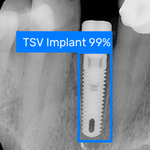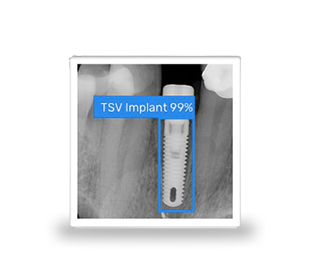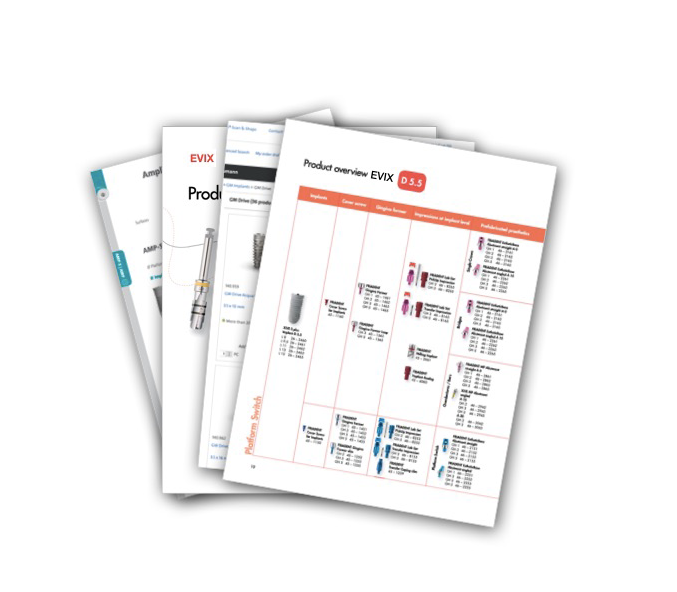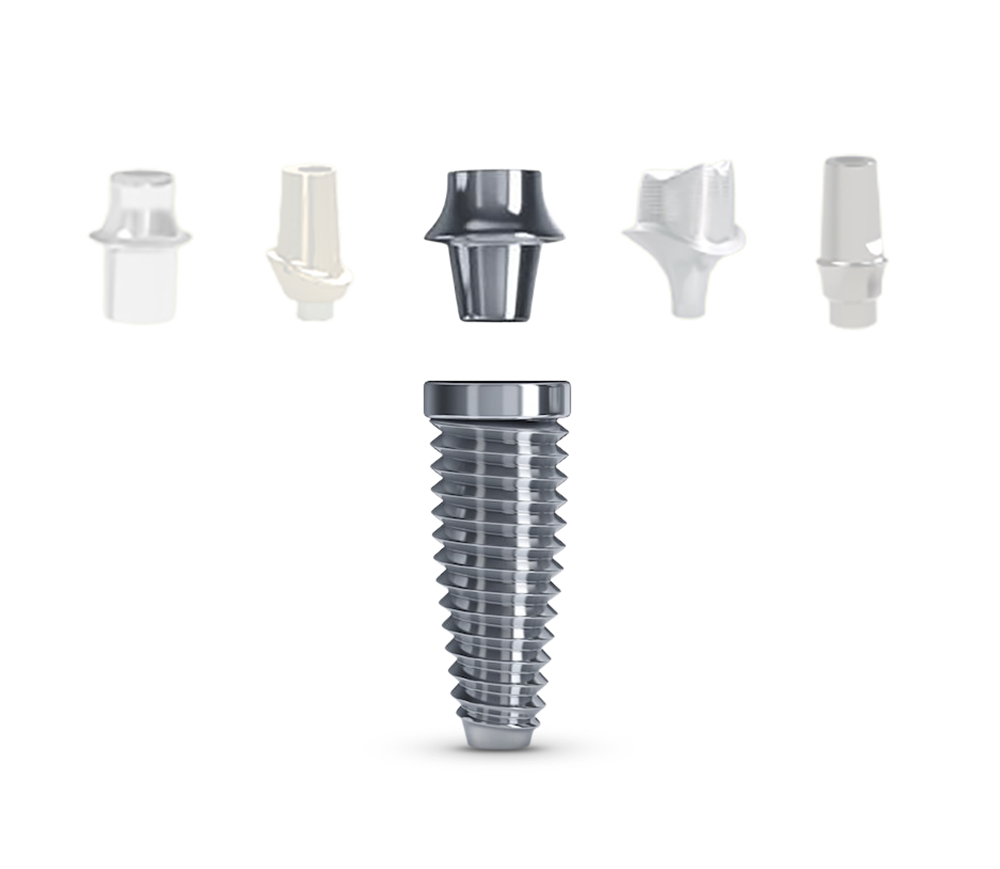AI at the Service of Implants Identification
Interview published in the CDF magazine on October 22, 2020Oct. 22, 2020
AI at the Service of Implants Identification
Interview published in the CDF magazine on October 22, 2020
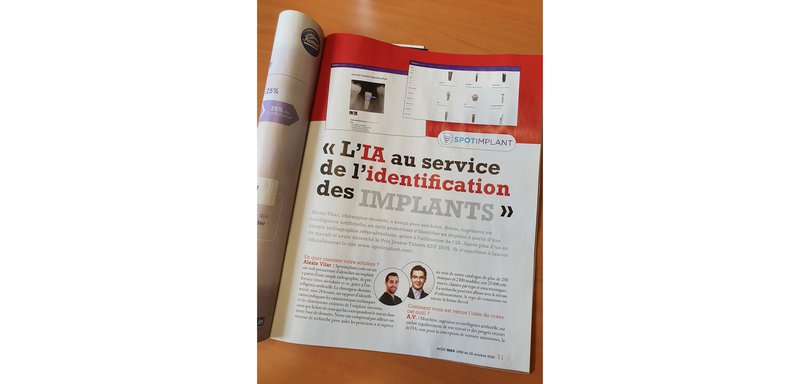
Alexis Vilar, a dental surgeon, together with his brother Denis, an Artificial Intelligence engineer, designed a tool to identify an implant from a simple periapical x-ray, thanks to the use of AI. After more than a year of work and winning the ADF Young Investigator Award 2019, they are now preparing for the official launch of the website www.spotimplant.com.
What is your solution?
Alexis Vilar: Spotimplant.com is a website that allows practitioners to identify an implant from a simple x-ray, preferably periapical, using artificial intelligence. Within 24 hours, the dentist receives an identification report with the technical characteristics and estimated dimensions of the implant, as well as a list of implants from our database that best match his unknown implant. Our website also includes a search engine to help dentists find their way through our catalog of more than 250 brands and 2,100 models, which means 25,000 references classified by type and characteristics. The search can be refined by the level of burial, the type of connection, or the shape of the neck.

How did you get the idea to create this tool?
Alexis Vilar: My brother, an engineer in the field of artificial intelligence, regularly told me about his work and the latest advances in AI, such as the development of autonomous cars, facial recognition, and medical diagnosis. One day, I told him about a particular situation I frequently encountered in my practice: identifying dental implants. He immediately told me that AI could solve this problem. At that time, we were working together to develop a prototype identification tool. The results were quite encouraging. The faculty members at Toulouse University in implant dentistry with whom I work were also enthusiastic and encouraged me to present the solution at the Young Talent Competition, at the ADF Congress in November 2019.
ADF contest you won...
Alexis Vilar: Indeed. I applied and, selected alongside nine other finalists, took the stage at the Congress to demonstrate AI's interest in dental surgery and explain how our instrument could help doctors and, ultimately, patients. I based my presentation on a clinical case I had met at Toulouse University Hospital: a person who has been treated thanks to the identification of his implant through the website. We are very proud to have been rewarded by the jury and the audience. This award has allowed us to confirm the interest of implantology professionals in our project and strengthen its legitimacy.
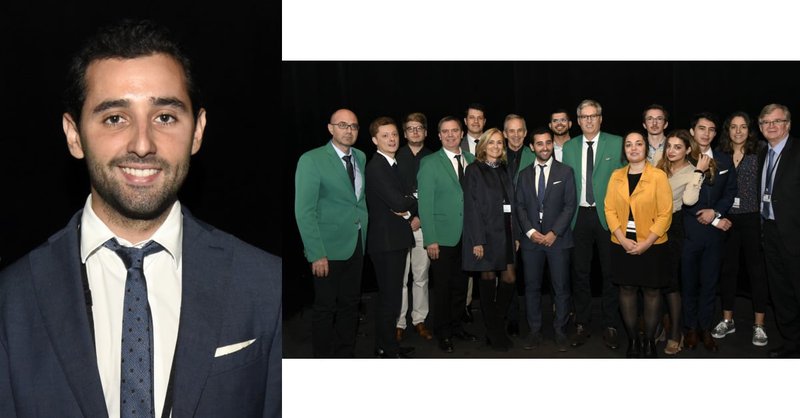
How has your project developed?
Alexis Vilar: I continued to develop this project with my brother and presented it in January, in Chamonix, at University Summit about implantology. In March, we were selected to participate in one of the programs of Wilco, a start-up incubator specialized in healthcare and located in the Paris region. This allowed us to receive an honorary loan and to be accompanied by experts in entrepreneurship. Consequently, we were able to attend numerous conferences dealing with marketing, regulations, etc. Then, in May, we finally launched our company. We started by collecting, sorting, and annotating thousands of anonymous x-rays of implants, and we "trained" our algorithm to identify an implant in the database we built. We also scoured manufacturer catalogs, websites, and archives for months to gather as many references as possible.
Are you now ready for the official launch of Spotimplant?
Alexis Vilar: Alexis Vilar: Absolutely. We launched - successfully - a beta test online, through which practitioners could submit their x-rays to us so we could recognize implants. We have patented our technology and are now ready for an official launch in the coming weeks. We are also awaiting the publication of a study in an international scientific journal that we conducted in collaboration with the CHU of Toulouse on the topic of "Identification of the characteristics of dental implants based on AI"!
A "GOOGLE" OF THE DENTAL IMPLANT
"Each year, several million dental implants are placed worldwide, says Alexis Vilar. Unfortunately, the traceability of each of them is not always guaranteed. 80% of dentists claim to have been confronted with this question: "What implant is it?" * Indeed, there are thousands of references on the market. It is impossible for a practitioner to recognize them all. Moreover, with the growth of medical tourism and an increasingly mobile population, it is more and more common to be confronted with a system from a foreign brand, he adds. But to work on an implant and know which screwdriver or part to order, accurate references are essential, especially since each brand works with parts that are specific to a system."
* “A pilot survey on the prevalence of clinical challenges to identify and restore unknown dental implants”, Walter RD, Wiafe S, Oyoyo U, Suprono MS., in J Oral Implantol., 2020;Feb 18.
Bio-Express
Alexis Vilar completed his studies at the faculty Dental Surgery in Toulouse in 2018 and has been working as a private practitioner since January 2019. He now works part-time for the company Spotimplant, which he founded with his brother, Denis. In September, he graduated from the Implantology speciality program in Toulouse. His thesis focused on identifying the characteristics of dental implants based on AI.
